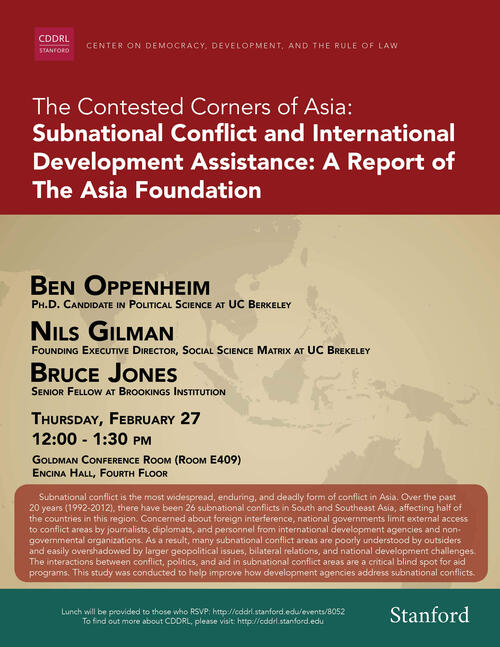Diamond honored with Lyman award for alumni engagement at Stanford
Larry Diamond, director of the Center on Democracy, Development, and the Rule of Law at Stanford's Freeman Spogli Institute for International Studies (FSI), received the 2013 Richard W. Lyman Award at a ceremony on January 22.
The Stanford Alumni Association (SAA) presents the annual Lyman Award to a faculty member who has gone "above and beyond" to engage alumni through volunteer activities that further the SAA's goal of lifelong learning.
Stanford Provost John Etchemendy presented the Lyman award to Diamond, recognizing him as "a university citizen of the highest degree," noting his willingness to engage Stanford alumni "whenever and wherever around the globe."
Along with his academic and administrative roles at Stanford, Diamond has dedicated time and enthusiasm to engaging Stanford's alumni community through events and travel study trips.
Diamond, a senior fellow at FSI, also is a senior fellow at the Hoover Institution and serves as the faculty co-director of the Haas Center for Public Service. He earned three degrees at Stanford: a bachelor's degree in political organization and behavior in 1974; a master's degree at the Food Research Institute in 1978; and a doctorate in sociology in 1980.
In accepting the award, Diamond described his first visit to Stanford as a high school debate student where his eyes were as big as saucers when he first saw the campus. From that moment forward he set his sights on doing everything he could to study at Stanford.
"My smartest decision was to turn down Harvard to come to Stanford," said Diamond. "It has been a gift to be at Stanford for the most of the past 45 years and to witness the remarkable growth of the university."
Diamond also recognized the leadership of Stanford's seventh president, Richard Lyman, who Diamond got to know when he was a student leader on campus during the turbulence of the early 1970's.
Since 1991, Diamond has presented talks at regional alumni meetings in cities across the country, including Honolulu, Seattle, Denver, Chicago, Washington, D.C., and New York. He also spoke at Leading Matters, a series of events that shared Stanford's vision for the future with nearly 13,000 alumni, family members and friends around the world during the five-year Stanford Challenge fundraising campaign.
Diamond recently returned from a two-week Stanford Travel-Study trip to Burma. He also has served as the faculty leader on alumni trips to Vietnam, Laos and Cambodia, Korea, South Africa, and the Middle East.
On campus, Diamond has presented "Classes Without Quizzes" at Reunion Homecoming. During last year's Commencement weekend, he gave the Class Day Lecture. In 2007 Diamond received Stanford's Lloyd W. Dinkelspiel Award for outstanding contributions to undergraduate education.
The award was established in 1983 in honor of the late Richard W. Lyman, Stanford’s seventh president, who died in 2012. In addition to the award, the prize includes funding toward books and materials designated by the recipient for the Stanford University Libraries.
Recent Lyman Award winners include Hank Greely, a law professor; Lyman P. Van Slyke, professor emeritus of history; and Al Camarillo, professor of history and special assistant to the provost for faculty diversity.




